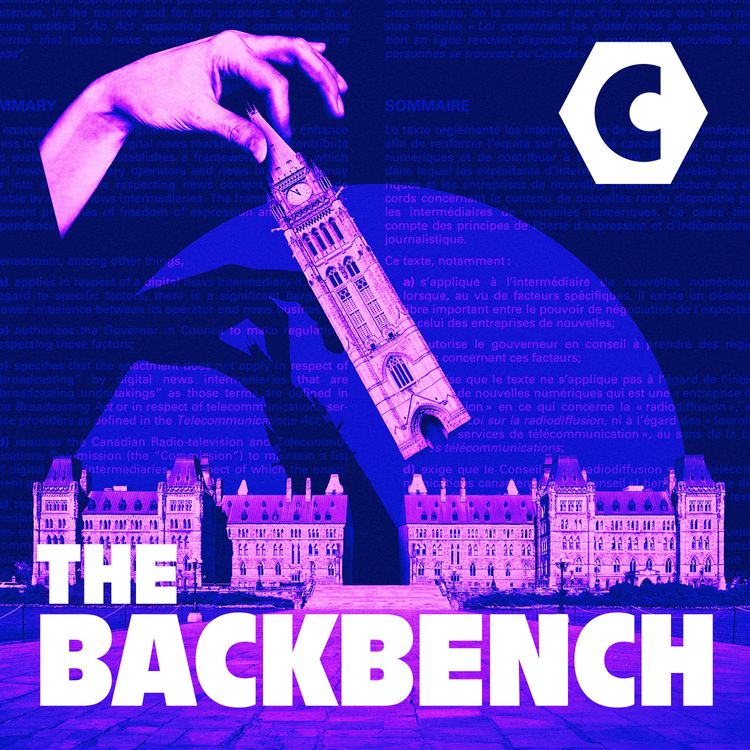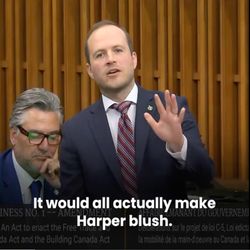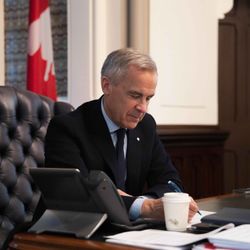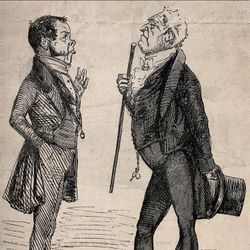Share

The Backbench
Roots of Tension in Canada’s Israel-Palestine Discourse
Editor's note: For additional context Hamas emerged in 1987 during the first Palestinian uprising, or intifada, as an outgrowth of the Muslim Brotherhood's Palestinian branch. The group is committed to armed resistance against Israel and the creation of an Islamic Palestinian state in Israel's place. For more: https://www.cbc.ca/player/play/2284721219710#:~:text=A%20spotlight%20was%20cast%20on,Ashley%20Fraser%20explores%20its%20origins.
In Canada, the political discourse on the news coming out of Israel and Palestine has given Backbench host, some “serious whiplash.” Discussions happening online seem extremely polarized, making it difficult to have productive and nuanced conversations. In this episode, Mattea sits down with Muhannad Ayyash, a Palestinian Professor of Sociology, and Jeremy Appel, a journalist and author, to get to the root of this contention.
Host: Mattea Roach
Credits: Aviva Lessard (Producer), Noor Azrieh (Producer), Caleb Thompson (Audio Editor), Annette Ejiofor (Managing Editor)
Guests: Muhannad Ayyash, Jeremy Appel
Background reading:
- Lobby group pushes Canada to conflate anti-Zionism with antisemitism – The Breach
- Weaponisation of anti-Semitism is bad for Palestinians – and Jews – Al Jazeera
- Walk-outs, sit-ins, pickets in Montreal in support of Palestinians in Gaza – CBC News
- Mosque attack victims shaken after hate-motivated assaults lead to Toronto man's arrest – CBC News
- These troubling times have revealed my Jewish parents were right about hate – Toronto Star
Sponsors: oxio, Athletic Greens
If you value this podcast, Support us! You’ll get premium access to all our shows ad free, including early releases and bonus content. You’ll also get our exclusive newsletter, discounts on merch, tickets to our live and virtual events, and more than anything, you’ll be a part of the solution to Canada’s journalism crisis, you’ll be keeping our work free and accessible to everybody.
You can listen ad-free on Amazon Music—included with Prime.
More episodes
View all episodes

Introducing: What Is Happening Here (Official Trailer)
04:23|Some say Canada is currently in the throes of a horrible surge of anti-Jew hatred. Others say that anti-zionism is being conflated with antisemitism.So which is it? And who is to blame for it — activists, or Israel?What is Happening Here is a co-production of Canadaland and The Canadian Jewish News. Listen to the first two episodes wherever you get your podcasts.Become a Canadaland supporter now and listen to the whole series plus bonus episodes, ad-free. https://canadaland.com/join/
We're in the Fight of Our Lives
13:23|Canadaland covers Canada, period.If there was ever a time to support Canadian news, it’s now. Go to canadaland.com/join and become a supporter today. Host: Jesse BrownCredits: Tristan Capacchione (Audio Editor & Technical Producer), Jesse Brown (Editor and Publisher)
What Are You Still Doing Here?!
02:16|The Backbench has moved!Episodes of The Backbench have been available on the Canadaland feed for a few months now, alongside lots of other great content — from original reporting to media criticism to our brand-new support-only show. Starting now, The Backbench feed (this one!) will no longer be publishing new episodes, but the show lives on! You can still find new episodes of this show every Tuesday on Canadaland.Just search “Canadaland” in your podcast player of choice, and we’ll see you there.
138. Looking for The Backbench? We’ve moved!
02:58||Ep. 138Since the end of last year, episodes of The Backbench have been available on the Canadaland feed, alongside lots of other great content — oftentimes featuring voices you may be familiar with from The Backbench. Starting in July 2025, The Backbench feed (this one!) will no longer be publishing new episodes, but you can still find new episodes of this show every Tuesday on Canadaland.Just search “Canadaland” in your podcast player of choice, and we’ll see you there.
136. Meet the Liberal MP Who Went Against Carney (and Who Might Take Out Doug Ford)
06:14||Ep. 136Mark Carney promised one Canadian economy. Now, his signature bill is one step closer to law as Bill C-5 rocketed through parliament with some amendments. The changes haven't quelled concerns from Liberal MP Nate Erskine-Smith, who broke ranks in the final vote. Host Noor sits down with MP Erskine-Smith to talk about why he voted no, and what he really thinks of Carney’s CEO-style politics. And, you’ll hear concerns from the Assembly of First Nations National Chief Cindy Woodhouse Nepinak about the process and lack of consultation. Plus some regulatory mythbusting by BC professors, Jess Dempsey, and Rosemary Collard.Host: Noor AzriehCredits: Aviva Lessard (Senior Producer), Sam Konnert (Producer), Noor Azrieh (Host/Producer), Caleb Thompson (Audio Editor and Technical Producer), Max Collins (Director of Audio) Jesse Brown (Editor), Tony Wang (Artwork)Guests: Nate Erskine-Smith, Cindy Woodhouse Nepinak, Jess Dempsey, Rosemary CollardBackground reading:Liberals' major projects bill passes House of Commons with Conservative support – CBC NewsBill C-5 passes the House of Commons vote after accelerated process – Canada’s National ObserverAs Parliament rushes to support Bill C-5, Indigenous groups prepare for legal fight – The LogicA tale of two Bill 5s The Extinction ParadoxDoes regulation delay mines? A timeline and economic benefit audit of British Columbia minesSponsors: Douglas is giving our listeners a FREE Sleep Bundle with each mattress purchase. Get the sheets, pillows, mattress and pillow protectors FREE with your Douglas purchase today at douglas.ca/canadalandIf you value this podcast, Support us! You’ll get premium access to all our shows ad free, including early releases and bonus content. You’ll also get our exclusive newsletter, discounts on merch, tickets to our live and virtual events, and more than anything, you’ll be a part of the solution to Canada’s journalism crisis, you’ll be keeping our work free and accessible to everybody. You can listen ad-free on Amazon Music—included with Prime.
135. G7! The One Where Trump Bounces
36:17||Ep. 135Canada is hosting the G-7 in Alberta, one of the most consequential meetings yet. Is this Carney’s moment to become a world leader, reorient our economy, and possibly the world order? With the predictably unpredictable Trump, growing regional wars, rampaging wildfires, and some controversial invitations, there’s a lot of room for error. Could Carney play the role of global power broker? And the latest on Pierre Poilievre’s one-on-one phone calls, our rekindling relationship with India, and another Liberal bill rushing through.Host: Noor AzriehCredits: Aviva Lessard (Senior Producer), Sam Konnert (Producer), Noor Azrieh (Host/Producer), Caleb Thompson (Audio Editor and Technical Producer), Max Collins (Director of Audio) Jesse Brown (Editor), Tony Wang (Artwork)Guests: Matthew HolmesFurther Reading on Our WebsiteSponsors: Douglas is giving our listeners a FREE Sleep Bundle with each mattress purchase. Get the sheets, pillows, mattress and pillow protectors FREE with your Douglas purchase today at douglas.ca/canadalandArticle is offering our listeners $50 off your first purchase of $100 or more! To claim, visit article.com/canadaland and the discount will be automatically applied at checkoutIf you value this podcast, Support us! You’ll get premium access to all our shows ad free, including early releases and bonus content. You’ll also get our exclusive newsletter, discounts on merch, tickets to our live and virtual events, and more than anything, you’ll be a part of the solution to Canada’s journalism crisis, you’ll be keeping our work free and accessible to everybody. You can listen ad-free on Amazon Music—included with Prime.
134. Is Carney’s Bill C-2 ‘Much Worse Than Trump’?
39:10||Ep. 134The Liberals’ first piece of legislation, Bill C-2 is a sweeping 139-page omnibus bill.It would allow police to open and inspect mail from Canada Post, restrict cash transfers over $10,000, bolster surveillance, and expand what law enforcement can do…without a warrant.But it will also overhaul our asylum-seeking process. And with the riots below the border, we can’t but ask: are we going down the same path?Host: Noor AzriehCredits: Aviva Lessard (Senior Producer), Sam Konnert (Producer), Noor Azrieh (Host/Producer), Caleb Thompson (Audio Editor and Technical Producer), Max Collins (Director of Audio) Jesse Brown (Editor), Tony Wang (Artwork)Guests: Adam SadinskyBackground reading:Experts warn of Bill C-2 as ’anti-refugee’ and ’anti-immigrant’ giving Canada ’unchecked powers’ like the U.S. – Radio CanadaOpinion | Border bill primed to give Mark Carney's government sweeping new powers. Who asked for this? - Toronto StarMontrealers protest against border security Bill C-2 – CTVWhy the ‘language of loopholes’ should be avoided if Trump cracks down on the Canada-U.S. border – The Conversation Ontario’s Bill 5 has passed. Here’s why it has sparked conflict with First Nations – The Canadian PressSponsors: Douglas is giving our listeners a FREE Sleep Bundle with each mattress purchase. Get the sheets, pillows, mattress and pillow protectors FREE with your Douglas purchase today at douglas.ca/canadalandArticle is offering our listeners $50 off your first purchase of $100 or more! To claim, visit article.com/canadaland and the discount will be automatically applied at checkout. If you value this podcast, Support us! You’ll get premium access to all our shows ad free, including early releases and bonus content. You’ll also get our exclusive newsletter, discounts on merch, tickets to our live and virtual events, and more than anything, you’ll be a part of the solution to Canada’s journalism crisis, you’ll be keeping our work free and accessible to everybody. You can listen ad-free on Amazon Music—included with Prime.
133. When Politics Ruins Friendships
31:18||Ep. 133Political divides are growing, and it’s not just over basic issues anymore. Increasingly, people are feeling differences in basic conduct, morality, and how they approach discussions. These divisions feel too big to ignore.How do you go about fixing that divide? This week host Sam Konnert sits down with Ryan Broderick to iron things out.And the latest on the grand meeting of the Premiers in Saskatoon, Carney’s new chief of staff pick and Trump’s doubling of the steel and aluminum tariffs. Host: Sam KonnertCredits: Aviva Lessard (Senior Producer), Sam Konnert (Host/Producer), Noor Azrieh (Producer), Caleb Thompson (Audio Editor and Technical Producer), Max Collins (Director of Audio) Jesse Brown (Editor), Tony Wang (Artwork)Guests: Ryan BroderickBackground reading:'Dude, I'm Done': When Politics Tears Families And Friendships Apart | NPRFriendship in divided times: People don't want to argue with you as much as you think | BBCIt is okay to lose friends due to politics | Johns HopkinsSponsors: Douglas is giving our listeners a FREE Sleep Bundle with each mattress purchase. Get the sheets, pillows, mattress and pillow protectors FREE with your Douglas purchase today at douglas.ca/canadalandArticle is offering our listeners $50 off your first purchase of $100 or more. To claim, visit ARTICLE.COM/BACKBENCH and the discount will be automatically applied at checkoutIf you value this podcast, Support us! You’ll get premium access to all our shows ad free, including early releases and bonus content. You’ll also get our exclusive newsletter, discounts on merch, tickets to our live and virtual events, and more than anything, you’ll be a part of the solution to Canada’s journalism crisis, you’ll be keeping our work free and accessible to everybody. You can listen ad-free on Amazon Music—included with Prime.
132. Endangered Species – an Interview with an NDP MP
30:12||Ep. 132Earlier this year, Jagmeet Singh laughed off the idea of losing. Now, he’s out and the NDP is in free fall. They lost official party status. They lost ground with key voters, organized labor, and their traditional strongholds in B.C. and the GTA. So, did the NDP learn anything from this catastrophic loss? To answer that question, host Noor Azrieh asks Heather McPherson, one of the 7 NDP MPs left. And, the latest on King Charles Canadian tour, who’s gonna babysit rowdy MPs in the House of Commons, and maybe it's time to break up with Jenni Byrne…for good this time.Host: Noor AzriehCredits: Aviva Lessard (Senior Producer), Sam Konnert (Producer), Noor Azrieh (Host/Producer), Caleb Thompson (Audio Editor and Technical Producer), Max Collins (Director of Audio) Jesse Brown (Editor), Tony Wang (Artwork)Guests: Heather McPhersonBackground reading:NDP caucus members dispute appointment of interim leader Don Davies – The Globe and MailNDP faces 'Parliament from hell' without official party status, says former MP – CBC NewsIs it R.I.P. for the federal NDP? Not quite, experts say – CBC NewsNew Democrats say they want leadership race rules to ensure multiple serious candidates, shorter contest – The Globe and MailKing Charles and Queen Camilla begin royal visit to Canada – CBC NewsPressure mounting on Poilievre to fire Jenni Byrne: sources – CBC NewsSponsors: Douglas is giving our listeners a FREE Sleep Bundle with each mattress purchase. Get the sheets, pillows, mattress and pillow protectors FREE with your Douglas purchase today at douglas.ca/canadalandHead to policyme.com and find a Health & Dental plan that actually fits your life, andreally only takes 5 minutes to apply.If you value this podcast, Support us! You’ll get premium access to all our shows ad free, including early releases and bonus content. You’ll also get our exclusive newsletter, discounts on merch, tickets to our live and virtual events, and more than anything, you’ll be a part of the solution to Canada’s journalism crisis, you’ll be keeping our work free and accessible to everybody. You can listen ad-free on Amazon Music—included with Prime.